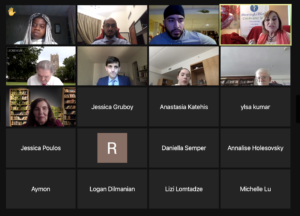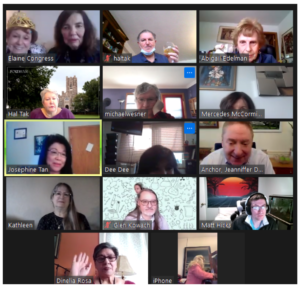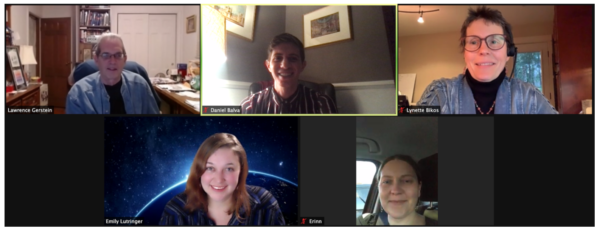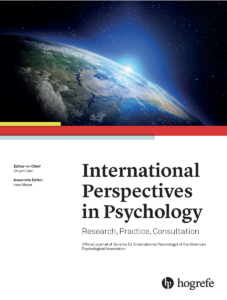
May 2021 – Volume 25, Issue 2
Editor: Stephen DiDonato
Associate Editor: Joyce Yip Green
Table of Contents
Message from the President
- Becoming Global: A Mandate for Division 52
-
Call for Nominations for Journal Editor of International Perspectives in Psychology: Research, Practice, Consultation
-
Psi Chi Welcomes United Arab Emirates Chapter During Arab American Heritage Month
- Suicide Prevention During Covid-19: Global Perspectives in 4 Regions
-
D52 Homestudy CE Program Announcement
-
Global Webinar Saluted Florence Denmark at 90 Years
- Division 52 Seeking to Establish a Website Committee
Global Perspectives
-
International Psychology Finally Comes to Japan. . . But Is It Needed?
-
Transformative Experiences of Study Abroad in Graduate Psychology Students
Collaborations
- International Psychology at the 2021 Eastern Psychology Association
-
A Center of Excellence Model for Serving Marginalized Youth and Young Adults
Early Career Professionals
- Early Career Psychology (ECP) Corner!
Student Corner
-
Message from 2021 Student Chair
- Student Discussions with Division 52’s Leadership
-
COVID-19 y Síndrome del Impostor: ¿La pandemia agrava el fenómeno para los estudiantes?
-
COVID-19 & Imposter Syndrome: Is the pandemic exacerbating the phenomenon for students?
- April Student Spotlights
Webinars
- Division 52 Webinar Series
Historical Perspectives
-
Nonconforming Data and the MMPE: Progress from Re-examined History
Upcoming Conferences and Events
- Primals Research Awards Announcment
International Perspectives in Psychology Brief
Note from the Editors
Art/Poetry Corner
 Message from our President
Message from our President
Lawrence H. Gerstein, PhD
Becoming Global: A Mandate for Division 52
Our Division has more than 800 members. Of these individuals, an overwhelming majority are from the United States (U.S.). Recently, however, our Division leadership has included a wider array of nationalities, races, and ethnicities. This is a very positive development. We must do better! Like others, I have wondered why so few students and professionals in psychology and related disciplines not in the U.S. have joined our Division. This is surprising when considering that our Division is not aligned with a particular specialty in psychology (e.g., social, I/O, clinical, counseling, school, cognitive) nor is it focused on a population (e.g., children) or an approach (e.g., family therapy, behavioral analysis, group psychotherapy).
I have heard many explanations for the lack of representation in our Division from around the globe. Some have reported our dues are too high. Others have stated there is confusion between being an international affiliate of APA and a member of our Division. Still other individuals have argued that our organization fails to provide unique and meaningful activities, resources, and opportunities to people from outside of the U.S. Related to this last point, some have claimed that the infrastructure and leadership structure of our organization is not conducive to fully engaging individuals located beyond the borders of North America. Finally, some people have reported that our organization lacks a presence worldwide, while others have posited that we should remain a predominantly U.S. led and populated Division.
I’m sure there is a degree of truth to each of the explanations above. Further, I’m certain there are additional reasons for the underrepresentation of non-U.S. students and professionals in psychology in our organization. I strongly believe the composition of our organization must change if we are to evolve as cross-culturally respectful, knowledgeable, and competent professionals, and if we are invested in enhancing the cross-cultural validity of psychology. In part, to accomplish this, we must intentionally investigate why we have so few non-U.S. members in our Division and what actions we can implement to overcome this reality.
COVID and the technologies (e.g., Zoom, Microsoft Teams) we have come to rely on have greatly accelerated our connections with each other worldwide, and has offered us insight into numerous countries, how psychology is understood and practiced, and a window into “the day to day” existence and contexts of diverse groups of individuals. These worldwide connections and opportunities will only increase and deepen even after COVID is “tamed.”
Therefore, our Division must act to identify, preserve, and strengthen the cross-national relationships and projects that have emerged during the pandemic, and strategize to ascertain what additional actions we can pursue to expand and sustain our network of members globally. I welcome hearing your thoughts about this.
One concrete step we can take now is for each of us to invite at least one person located outside of the U.S. to submit a proposal to present a talk in the Division’s Global Psychology Café Virtual Suite at APA from August 12 to 14. If we each do this, we would be inviting 800+ individuals from around the world to submit their work. Another action we can take is to invite one other individual that is not living in the U.S. to attend the informal (e.g., committee meetings, networking meetings) and/or formal programs in our APA Suite. This translates to 800+ additional people!
I want to point out that there is no fee to present and/or attend programs in our Suite. The Call for Suite Programs can be found in this Newsletter. Our Division and all of us can benefit and become enriched and invigorated from even a fraction of the 1,600 individuals from around the globe interacting with each other in our Suite. I urge you to commit to this initiative! As I said earlier, please share your ideas about what actions we can implement to transform Division 52 from a U.S. centric to a global community of persons involved in psychology and related disciplines.
Call for Nominations for Journal Editor of International Perspectives in Psychology: Research, Practice, Consultation
The Division 52 (International Psychology) of the American Psychological Association is pleased to welcome nominations and self-nominations for the editorship of International Perspectives in Psychology: Research, Practice, Consultation (IPP) for the years 2022–2026. Dr. Stuart Carr, Ph.D., is the current editor. The journal is published by Hogrefe Publishing Corp.
International Perspectives in Psychology: Research, Practice, Consultation® is committed to publishing research that examines human behavior and experiences around the globe from a psychological perspective. It publishes intervention strategies that use psychological science to improve the lives of people around the world.
The journal promotes the use of psychological science that is contextually informed, culturally inclusive, and dedicated to serving the public interest. The world’s problems are imbedded in economic, environmental, political, and social contexts. International Perspectives in Psychology incorporates empirical findings from education, medicine, political science, public health, psychology, sociology, gender and ethnic studies, and related disciplines. The journal currently publishes around 20 papers per annual volume.
The journal addresses international and global issues, including
- inter-group relations
- disaster response
- societal and national development
- environmental conservation
- emigration and immigration
- education
- social and workplace environments
- policy and decision making
- leadership
- health care
- poverty and economic justice
- the experiences and needs of disadvantaged groups
Please read more about the journal here: https://www.hogrefe.com/us/journal/international-perspectives-in-psychology-research-practice-consultation
Candidates should be available to start receiving manuscripts in late 2021 to prepare for issues published in 2022. The ideal candidate will be someone who may have served on the IPP editorial board, is knowledgeable in the broad domains of international psychology, possesses excellent organizational and interpersonal communication skills, and is familiar with the Editorial Manager online manuscript submission and peer-review system. Candidates who are members of underrepresented groups and/or reside outside of the United States are encouraged to apply. Candidates must be proficient in English. Candidates will receive a stipend. Self-nominations are accepted and encouraged.
If not already a member, the new Editor must become an APA member and a member of Division 52, remaining as such throughout the editorial term. Preference will be given to candidates who have been members of APA and Division 52 for at least two years. All applicants should have an interest in International Psychology.
Applications should include a one to two page statement outlining the candidate’s vision for the future of the journal, a CV, and, if nominated, a brief (one page or less) letter of endorsement from the nominator.
Nominations, including self-nominations, should be submitted to Lawrence H. Gerstein, Ph.D. at lgerstein@bsu.edu by May 31, 2021.
We look forward to receiving your nominations.
Search Committee: Lawrence H. Gerstein, Ph.D. (Chair); Deborah L. Best, Ph.D; Kurt F. Geisinger, Ph.D.; and Brigitte Khoury, Ph.D.
Psi Chi Welcomes United Arab Emirates Chapter During Arab American Heritage Month
Martha S. Zlokovich, PhD
Psi Chi Executive Director
Brien Ashdown, PhD
Psi Chi International Director
Alaa Itani
Psi Chi Inductee, American University of Sharjah
Mohammad AlMalik
Psi Chi Inductee, American University of Sharjah
Angela Maitner, PhD
American University of Sharjah Psi Chi Chapter Faculty Advisor
Psi Chi congratulates our newest international chapter at the American University of Sharjah (AUS), United Arab Emirates, on their April installation ceremony. It seems especially fitting that we celebrate the new chapter during April, Arab American Heritage Month, and that Division 52’s IPB provided a new opportunity to make the announcement in both English and Arabic.
The application for Psi Chi membership was spearheaded by students after AUS launched its major in psychology in Fall 2019. Central to the programs’ goals are the development of cross-cultural understanding, and applying evidence-based thinking and ethical principles to psychological research.
The new chapter’s Faculty Advisor is Angela Maitner, PhD, an Associate Professor in Social Psychology. She joined Psi Chi as an undergraduate student at Eckerd College, St. Petersburg, FL. Dr. Maitner said, “Our program is excited to join a society promoting excellence in the science and application of psychology, and to be able to formally and internationally recognize our students for their dedication and success in the field.”
On April 29, 2021 AUS will hold its installation ceremony, inducting 21 students and 4 faculty members.
AUS joins the American University of Cairo as Psi Chi’s second Arab nation chapter. The AUC chapter was established in 2012. Jaime Mendoza, PhD is the current Faculty Advisor.
As of April 6, 2021 Psi Chi had established 28 chapters outside the U.S. 50 states. These chapters are in 17 countries and three U.S. territories. To view all of Psi Chi’s international chapters, go here and click on See All International Chapters: https://www.psichi.org/page/international_news#opportunities.
ترحب ساي كاي بفرع الإمارات العربية المتحدة خلال شهر التراث العربي الأمريكي
د. مارثا س. زلوكوفيتش
المديرة التنفيذية لساي كاي
د. براين أشداون
مدير ساي كاي الدولية
آلاء عيتاني
متدربة ساي كاي، الجامعة الأمريكية في الشارقة
محمد المالك
متدرب ساي كاي، الجامعة الأمريكية في الشارقة
د. أنجيلا مايتنر
مستشارة الكلية بفرع ساي كاي بالجامعة الأمريكية في الشارقة
ساي كاي (Psi Chi) يبارك افتتاح أحدث فرع عالمي في الجامعة الأمريكية في الشارقة (AUS)، الإمارات العربية المتحدة، في حفل التنصيب في أبريل. من المناسب جداً الاحتفال بالفصل الدراسي الجديد خلال شهر أبريل، شهر التراث العربي الأمريكي، وقد وفرت IPB التابعة للقسم 52 فرصة جديدة للإعلان باللغتين الإنجليزية والعربية.
بعد أن أطلقت الجامعة الأمريكية في الشارقة تخصصها في علم النفس في الفصل الدراسي في خريف 2019، قاد الطلاب طلب الحصول على عضوية ساي كاي، وتتمثل أهداف البرنامج في تطوير التفاهم بين الثقافات، وتطبيق التفكير القائم على الأدلة والمبادئ الأخلاقية على البحث النفسي
مستشارة الهيئة التدريسية الجديدة في هذا الفصل هي أنجيلا مايتنر، حاصلة على درجة الدكتوراه، وأستاذة معاونة في علم النفس الاجتماعي. انضمت إلى ساي كاي (Psi Chi) كطالبة جامعية في كلية إكيرد ، سانت بطرسبرغ ، فلوريدا. قالت الدكتورة مايتنر ،”برنامجنا متحمس للانضمام إلى مجتمع يعزز التميز في علم وتطبيق علم النفس، وللتمكن من الاعتراف رسميًا وعالمياً بطلابنا لعزمهم ونجاحهم في هذا المجال.”
في 29 أبريل 2021، ستقيم الجامعة الأمريكية في الشارقة حفل التنصيب، بمشاركة 21 طالبًا و4 أعضاء هيئة التدريس.
تنضم الجامعة الأمريكية بالشارقة إلى الجامعة الأمريكية بالقاهرة (AUC) كالفرع الثاني في المنطقة العربية في منظمة ساي كاي (Psi Chi). تأسس فرع الجامعة الأمريكية بالقاهرة في عام 2012. د. جايمي ميندوزا هو مستشار الكلية الحالي.
منذ 6 أبريل 2021 ، أنشأت ساي كاي 28 فرعاً خارج الولايات الخمسين في الولايات المتحدة. هذه الفروع في 17 دولة وثلاثة مناطق أمريكية. لعرض جميع الفروع العالمية لـساي كاي، اذهب إلى وانقر على
انظر جميع الفصول الدولية:
See All International Chapters: https://www.psichi.org/page/international_news#opportunities.
Suicide Prevention During Covid-19: Global Perspectives in 4 Regions
Samer Sabbour & Ani Kalayjian
On 5 May 2021, various ATOP MeaningfulWorld members successfully presented a symposium at 2021 Eastern Psychological Association’s (EPA) annual conference on: Suicide Prevention During Covid-19.
See summary: ATOP MeaningfulWorld EPA Summary

Global Webinar Saluted Florence Denmark at 90 Years
Elaine Congress & Harold Takooshian, IMCES
On January 27, 2021, over 50 revelers from as far as Austria joined to celebrate online the joyous 90th birthday of beloved international psychologist Florence L. Denmark. Florence is known internationally as a teacher, researcher, author, mentor and, of course, a co-founder and past-President of APA Division 52.
For two hours, doyen Florence shared memories with grateful family, friends, colleagues and students–sharing many photos, a toast and virtual birthday cake. Despite 10 months of austere covid lockdowns across many regions, these celebrants were awash in warm wishes and memories with Florence and each other, and heard two poems saluting Florence (by Drs. Elaine Olaoye and Ani Kalayjian).
Florence can be most easily reached by email, at fdenmark@pace.edu .
For a link to the joyous 130-minute recording, contact webinar host Elaine Congress at Congress@fordham.edu .

Division 52 Seeking to Establish a Website Committee
Division 52 asks members to volunteer to join the Web Committee that will review, edit, and modify the Division 52 Web site (www.div52.net). The committee will develop style standards and will maintain an active training program for Division Committee Chairs and other Leaders (or their designees) to maintain relevant sections of the site (e.g., student pages; ECP pages; Webinar pages; Convention pages).
Interested individuals should email Dr. Merry Bullock (MerryBullock@mac.com) by no later than June 15 indicating their interest to join the Website committee, their expertise related to web design and management, and their vision for the future of the Division’s site.
See https://div52.net/call-for-web-committee-members/
International Psychology Finally Comes to Japan…But Is It Needed?
Daniel Velasco, PhD
The Chicago School of Professional Psychology, USA
Rikkyo University, Japan
International Psychology Finally Comes to Japan
In 2009, The Chicago School of Professional Psychology launched the first PhD program in International Psychology (IP). The program combined online coursework (which at that time was not a popular mode of learning) with residencies in their Chicago campus and two international field experiences. It was an exciting program—one that received the UPCEA International Program of Excellence Award in 2019 (Morrison, 2021)—and I am honored to be a member of the first cohort and graduating class. Being one of the first graduates with a PhD in International Psychology, I wanted to make sure I set an example for future cohorts by living out what I learned. So, in 2012, a few months after graduating, I moved to Japan to begin a new life as an International Psychologist.
The first few years were tough because no one in Japan had heard of International Psychology, and during all of my interviews for professor positions, I was interrogated about the IP program and the validity of my degree. With conviction and passion, I always expressed the importance of International Psychology and the need for its presence in Japan. Although I started my university career in Japan teaching English, eventually I found a position teaching psychology.
Every year, I would submit a proposal to the department to include an introductory course in International Psychology. Every year, the proposal would be rejected because, and I was often told, “Japanese students have never heard of International Psychology, so no one will take the course.” Finally, after 8 years, Tokyo University of Foreign Studies (東京外国語大学), a well-known and respected university in Japan, reached out to me to develop and teach Introduction to International Psychology. This comes as no surprise, as TUFS “play[s] an important role as one of the hubs of international academic research and exchange in Japan” (Tokyo University of Foreign Studies, 2021).
So, finally, after obtaining my PhD in IP nine years ago, and spending the last eight years in Japan teaching and providing mental health counseling, International Psychology is finally finding a home in Japan.
…But Is It Needed?
日本での導入以来、心理学は大きな前進を遂げ、日本社会でより信頼できるものになりつつある。しかし、日本において精神疾患やメンタルヘルスのサポートを求めることに対する抵抗感は根強く、日本人への適用可能性という視点から、日本における心理学は重要な研究領域であり続けている(Ando, et al.、2013)。森田療法のような日本固有の心理学は存在し、日本森田療法学会に代表される独自の組織によって推進されているが(JSMT、2009)、このことは一般の日本人にはほとんど知られていない。より国際的でグローバルな視点をもって、心理学を文化的に適応させていくことが課題であろう。日本の心理学に新たな国際的視点をもたらす架け橋となる―ここに、国際心理学が重要な役割を果たす可能性がある。日本における西洋の影響は明らかであり、テクノロジーによってグローバルな視点や問題に関する情報は急速に広められている。日本における国際心理学の謙虚な始まりによって、心理学の力が真に日本で認知され、日本文化への感受性をもった日本社会に適切な理論の発展が促されることを期待したい。
Since its introduction in Japan, psychology has taken great steps forward and is gaining more creditability in Japanese society. However, due to the stigma associated with mental illness and seeking out mental health support, psychology in Japan continues to find its place as a well-respected discipline due to questions of its applicability to Japanese people (Ando, et al., 2013). Indigenous Japanese psychologies, such as Morita Therapy, do exist, and are promoted by their own organizations like the Japan Society for Morita Therapy (JSMT, 2009). However, they are largely unknown to the average Japanese person. The major concern is the cultural adaptation of psychology coupled with a more international, global perspective. This is where International Psychology can play an important role—by becoming the supportive bridge to new global perspectives on psychology in Japan. Western influences in Japan are apparent, and technology is quickly spreading information about global ideas and issues. It is with great hope that this humble beginning of International Psychology in Japan will help the country recognize the true power of psychology and promote the development of theories that are culturally sensitive and appropriate to help Japanese society.
References
Ando, S., Yamaguchi, S., Aoki, Y., and Thornicroft, G. (2013). Review of mental-health-related stigma in Japan. Psychiatry and Clinical Neurosciences. 67(7):471-82. doi: 10.1111/pcn.12086
Japan Society for Morita Therapy. (2009). Homepage. https://www.jps-morita.jp
Morrison, C. (2021). International Psychology celebrates anniversary and award. https://www.thechicagoschool.edu/insight/from-the-magazine/international-psychology-celebrates-anniversary-and-award/
Tokyo University of Foreign Studies. (2021). About TUFS: History. http://www.tufs.ac.jp/english/abouttufs/pr/history.html
Transformative Experiences of Study Abroad in Graduate Psychology Students
Jacqueline J. Herrera, Holli M.R. Eaton, Joy M. Bustrum, Katie C. Mendoza, and Samuel M. Girguis
Azusa Pacific University
I think I’m walking away from the experience with a profound sense of empathy. Empathy for the victims of course, but also for human suffering, victims of crimes, and those who have had their innocence taken from them. I have a completely different and deeper, though more tragic, conceptualization of the scope of human suffering.
– Student’s visit to Auschwitz Extermination Camp
Discussion
This study examined student participants’ thoughts regarding their study abroad experience as it relates to their personal and professional development. In addition to the course requirement of maintaining a journal throughout the study abroad course, the professor leading the course shared a pedagogical framework for understanding the purpose of conducting a History and Systems of Psychology course abroad. Mapp (2012) found that faculty-led study abroad programs facilitated significant gains across all domains of cross-cultural adaptability. A sizeable body of research has affirmed such findings, suggesting students who participate in study abroad programs demonstrate growth in cultural awareness/sensitivity and personal adjustment (Anderson, Lawton, Rexeisen, & Hubbard, 2006; Chieffo & Griffiths, 2004; Fairchild, Pillai, & Noble, 2006; Ingraham & Peterson, 2004; Poole & Davis, 2006), in addition to significant gains in the targeted discipline-specific factual knowledge (Houser, Brannstrom, Quiring, & Lemmons, 2011).
The phenomena related to the current study are outlined as follows:
- There are prescribed learning experiences, casual cultural interactions, and interpersonal relationships with students and faculty that all impact student learning and growth on an emotional and educational level.
- Students develop a deep understanding of the importance of the history and systems of psychology and how they impact their career and professional identity.
- The study abroad experience impacted students on an emotional, educational, and interpersonal level.
The six themes found in this study have similarities to the overarching concepts of global mindedness, intercultural communication, openness to diversity, and cultural intelligence (Abrams & Ziegler, 2016; Clarke et al., 2009; Earnest et al., 2016; Engle & Crowne, 2014; Mapp, 2012). In the first two themes, personal growth and insight related to culture, students described the internal changes that meet the definitions of global mindedness, openness to diversity, and cultural intelligence. The first quote captures the student’s realization about how other countries and cultures view Americans. The fifth theme, impact of in-vivo experiences, is related to the theme of study abroad as a whole and the experiential learning embedded in the experience. In the sixth theme, travel challenges, students reported aspects of intercultural communication. Students reported feeling frustrated by their inability to communicate with others or understand directions.
Two themes specific to the course, History and Systems of Psychology Study Abroad Tour, are the third and fourth themes, insight related to the field of psychology and professional identity development. These themes, although evident in many study abroad programs, are directly related to graduate students as they process the trip, given the history of their field, their own place within psychology, and their professional development.
References
Abrams, K., & Ziegler, N. (2016). Facilitating study abroad for psychology students. Psychology Teaching Review, 22(2), 4-17.
Clarke, I., III, Flaherty, T. B., Wright, N. D., & McMillen, R. M. (2009). Student intercultural proficiency from study abroad programs. Journal of Marketing Education, 31, 173-181. https://doi.org/10.
Earnest, D. R., Rosenbusch, K., Wallace-Williams, D., & Keim, A. C. (2016). Study abroad in psychology: Increasing cultural competencies through experiential learning. Teaching of Psychology, 43(1), 75-79. doi:10.1177/0098628315620889
Engle, R. L., & Crowne, K. A. (2014). The impact of international experience on cultural intelligence: An application of contact theory in a structured short-term programme. Human Resource Development International, 17(1), 30-46. https://doi.org/10.1080/
Mapp, S. C. (2012). Effect of short-term study abroad programs on students’ cultural adaptability. Journal of Social Work Education, 48, 727-737. https://doi.org/10.5175/JSWE.
International psychology at the 2021 Eastern Psychological Association
Harold Takooshian
Back in 2002, the Eastern Psychological Association (EPA) made history as the first of the seven U.S. regionals to offer a program track in “international psychology”—which is now a model for other regionals. For 18 years since its 2003 program, EPA has featured a long list of some world leaders in psychology—from Leonore Loeb Adler to Philip G. Zimbardo.
When the EPA in Boston in March of 2020 was cancelled by state authorities, the unstoppable EPA Board and its Executive Officer Paul Schnur opted to hold a virtual conference on June 17-18. This EPA international program included over 20 presentations from as far as Japan. A highlight of this program was a video salute to beloved Jean Lau Chin (1944-2020), who was already in this EPA program before Jean and her husband Gene succumbed together to covid-19. See this video EPA salute: https://cbsloc.al/3i3THIE
In 2021, the EPA program on March 5-6 in Philadelphia again became an online conference. And once again, the four-person EPA international team (Elaine Congress, Florence Denmark, Uwe Gielen, Harold Takooshian) assembled a dynamic international program, with 27 presenters from across the USA and overseas, as part of its 85-page EPA program book. [See note 1 below.]
For any details, check www.easternpsychological.org , or contact EPA international subprogram chair Harold Takooshian, takoosh@aol.com
————–
Note 1: www.easternpsychological.org/files/DOCUMENTLIBRARY/EPA_Program_2021_-_FINAL.pdf
A Center of Excellence Model for Serving Marginalized Youth and Young Adults
Wayne Centrone, MD, MPH, Health Bridges International, Portland, Oregon, USA and Lima, Perú
William Greenman, ALMFT, Paths of Hope, Lima, Perú
Carmen Elena Zavala Thompson, BS, Health Bridges International, Lima, Perú
Stephen DiDonato, PhD, Thomas Jefferson University, Philadelphia, PA, USA
Children need family guidance and support. The problem is that not all children have access. Experiences of poverty, abuse, and neglect conspire against many children. Too many children end up abandoned or living in orphanages or state-run homes. According to UNICEF, over 153 million abandoned children worldwide are institutionalized. While these institutions provide shelter, most do not provide skilled staff to reinforce healthy attachment and resilience. This means, for many of these children – the hardest parts of their lives are still in front of them.
Youth with complex adverse experiences, who are not allowed to build supportive attachments and develop strong resilience, often face later life challenges like incarceration, low educational attainment, and physical, emotional, and mental health issues. Without a framework for healthy emotional development and resilience, institutions are left to hope their efforts lead to a better life for a child, and rarely is this the case.
On May 4, 2021, Health Bridges International, a U.S. and Perú based non-governmental organization with over 25 years’ experience working in global child welfare, along with the Thomas Jefferson University (U.S.), Universidad Católica Santa Maria (Perú), and the Perú-based NGO Paths of Hope – launched a pilot program designed at reshaping child welfare services in the country of Perú.
A middle-income country with sophisticated systems and professionals, Perú is the perfect proving ground to create such a model. Its state agencies and laws create an enabling environment for our robust, evidence-based models of care delivery for focused on forgotten and marginalized children. Perú offers a unique environment to build and research a model child welfare program.
The Center of Excellence model provides a holistic roadmap to prepare and equip orphanages, foster-care programs, and child-welfare settings for serving marginalized youth. Included in the model is a training framework that aims to support a culture of health within agency to build attachment and resilience, practical guidance on applying evidence-based practices, culturally appropriate support to reinforce best practices, and resources to reshape child-welfare services into whole-child empowerment services.
The Center of Excellence research project is broken into four distinct phases. Phase I of the research will address the need for to develop a culture that can provide an organized structure of care delivery and supportive services for youth and adolescents living in residential care settings in developing countries. Phase II of the research will evaluate the impact of a training curriculum through assessment of the implemented strategies and long-term follow up to see if there are changes in child outcomes (job placement, educational attainment, health, mental health, etc.). Phase III will evaluate the resources needed to build reproducible outcomes. Finally, Phase IV will evaluate the tools and resources needed to reinforce change and reorient child service cultures from welfare-based to an empowerment-oriented,
Over the course of the research, we will implement comprehensive systems change training curricula, practical program facilitation resources and methods for advancing Communities of Practice and culture shifts. The material will cover a diverse range of subjects focused on developing competency in trauma awareness and stewardship, motivational enhancement, and strengths-based approaches. The goal of the research is to develop a competency in staff and culture in a child-welfare environment to generate greater attachment and better longitudinal life-course outcomes.
There is a need for a consolidated training roadmap that can be used with residential care facilities to better train caregivers and health providers. Such a toolkit will provide a structure and framework for training in evidence-based practices and a roadmap for sustaining a culture and environment of youth-focused empowerment.
The research is clear, programs grounded in a culture of health who have better trained staff and service provider’s leads to better attachment, deeper resilience and better outcomes. Every child deserves access to the life they dream, and we believe this model can make such an ambition probable.
Early Career Psychology (ECP) Corner!
Greetings from the ECP Corner, this spot is designed to visualize, promote, and connect EPCS members of Division 52. As part of this community, we would like to encourage you to reach out to the members of the ECP Committee – to let us know you better. We are interested in getting familiar with your career’s development, interests, and concerns regarding international psychology. As committee, we target to strengthen the visibility of our community in such a way to get connected throughout the year by taking advantage of technology.
Learning from the current pandemic environment where distances became nebulous, advantages have emerged to set up synchronized sessions to learn from each experience among other strategies. As an example of these successful sessions, during the past 2020 APA virtual-format convention, we held several meetings to discuss and share about different topics of interest for ECPs (night of the Oscars / 2020 Div52 awardees, mentorship sessions, etc.), these sessions were held during all convention days and scheduled at different times to facilitate connecting to ECPs living around the world.
In a similar path of action, this year and before this 2021 APA Convention, we can bring enrichment to our community via building an ECP agenda to work on developing specific strategies that impact our professional activities, we can start building capacity to put the wheels in motion to projects related to professional development, academic and research resources, partnerships, etc. As you can see, possibilities are endless. For this reason, we invite you to connect and bring in your ideas, questions, and work to help us strengthen our community.
We, the ECP committee members would love to catalyst your voice. So, let us keep in touch and send a few lines to get you onboard, spread the word, and help us to keep the good work for our international community.
Feel free to reach me at juan.valdivia@fulbrightmail.org
Antonio Valdivia (2021 ECP Committee Chair).

Message from 2021 Student Chair
Daniel Balva
Div. 52 Student Chair 2021
Dear Division 52 Student Members,
I hope this correspondence finds you well. It is with great pride, humility, and honor that I introduce myself as your current Student Chair for Division 52. It has been a privilege to work alongside our Past-Student Chair, Ankita Nikalje, as her dedication to international psychology and her attention to cultural sensitivity to help internationalize psychology has been inspirational, to say the least. I would like to thank and acknowledge her for all she has done and continues to do. Similarly, I am glad to introduce the division’s Student Chair-Elect, Erinn Cameron, whose wealth of international experience and dedication to human rights bring an impactful perspective to the student board.
The Division 52 Student Committee has been working on multiple initiatives to ensure that our division can provide a place of support, comfort, connection, and education for each student member throughout this next year. Throughout the upcoming year, your Student Committee and I will work tirelessly to help bring us as a division closer to achieving this goal. In the upcoming weeks, our committee will be initiating multiple initiatives focused on learning more about 1) existing cultural exchange, immersion, and study programs, 2) online research databases in different regions of the world, 3) and areas of research involvement and expertise of members across the division. As we roll out these initiatives, our Student Committee will also be implementing bimonthly “Dine & Discuss” opportunities for personal discussions with leading figures of international psychology, while working with the division’s wonderful webinar committee on hosting student-focused webinars to better prepare our students for international clinical, research, and funding opportunities.
We have also been working closely with various APA divisions and international associations and organizations on setting up collaborations and partnerships for our students during this next year. As such, our students can expect collaborative networking and educational events with Division 56 (Trauma Psychology), Division 17’s (Counseling Psychology) International Section, AMENA-PSY, NLPA, Psi-Chi, the International Council of Psychologists, the Interamerican Society of Psychologists (SIP), and many more! These meaningful collaborations will allow our students to better connect with fellow students around the world so that we can work together to bridge international gaps within our profession and learn from one another in order to truly foster a representative and international psychology.
We encourage our student members to get involved in any of the existing committees within Division 52 and to share your thoughts, ideas, and passions with us because you each have something special to offer our division and our profession at large. If you are interested in becoming involved with Division 52, please feel free to contact me at Daniel.balva@uga.edu. We have also included a few links below to keep in contact with Division 52 and the Student Committee, including a link to join the Student Listserv and links to the Student Section of the division’s website (which contains important international resources), and social media links for the division. We will be using the Student Listserv to promote many of our upcoming events, so please be sure to sign up and stay apprised!
Please do not hesitate to email me throughout this upcoming year with ideas, questions, concerns, or ways in which myself or the Student Committee can be of service to you, and we will do our best to support you. To humbly and respectfully quote Harriet Tubman, “Always remember, you have within you the strength, the patience, and the passion to reach for the stars to change the world.” I look forward to reaching for the stars and changing the world with each of you.
Sincerely,
Daniel Balva, M.S., NCC, CRC
Student Chair, APA Div. 52, International Psychology
Student Section of Division 52 Website
Student Discussions with Division 52’s Leadership
On Friday, March 12, 2021, our student members had the opportunity to meet with some of Division 52’s leadership, including Division 52 President, Dr. Larry Gerstein, and Division 52’s Vice President of Engagement, Dr. Lynette Bikos. This programming allowed our students to get to know our division’s leadership more personally, while giving student members the chance to discuss international related topics including study abroad, study away, and cultural exchange programming. Our next student discussion, titled “Dine & Discuss” will be taking place via Zoom on Friday, April 23, 2021 at 6:00 p.m. (EDT). During this time, students will have the opportunity to virtually gather around the kitchen table and share a meal and meaningful conversation with Dr. Merry Bullock. More information will be sent out via Division 52’st Student Listserv. Be sure to stay apprised of emails via the Division 52 Student Listserv for information regarding upcoming “Dine & Discuss” chats with other leaders of the division and trailblazers in the field of international psychology!

COVID-19 y Síndrome del Impostor: ¿La pandemia agrava el fenómeno para los estudiantes?
Rita M. Rivera, M.S.
El síndrome del impostor, también conocido como fenómeno del impostor, se define como una experiencia interna de creer que uno no es tan competente como los demás y que el éxito de uno se debe más a la suerte que al mérito propio. Es común que quienes experimentan el fenómeno del impostor atribuyan su éxito a factores externos y critiquen sus logros. Este fenómeno psicológico afecta a muchos individuos, y los estudiantes son considerados una población vulnerable a este síndrome. Los estudiantes también pueden temer no estar a la altura de las expectativas, hacer frente a sentimientos de insuficiencia y reportar altos niveles de estrés y ansiedad. En general, el síndrome del impostor puede tener efectos adversos en la salud mental y el bienestar de los estudiantes.
La pandemia de COVID-19 ha agravado muchos problemas preexistentes al tiempo que ha dado lugar a nuevos desafíos. Las actividades educativas de los estudiantes se han visto interrumpidas, lo que ha obligado a muchos alrededor del mundo a adaptarse a nuevas modalidades, rutinas y ajustes en un período corto. La educación en línea, también conocida como e-learning, se convirtió en la nueva norma para la mayoría de las instituciones educativas. Esta modalidad en sí generó muchos obstáculos para los estudiantes, específicamente para aquellos que no podían acceder a la tecnología requerida. Para otros estudiantes en naciones e instituciones donde era imposible adoptar el e-learning, su educación se interrumpió por completo. Además, los estudiantes inscritos en pasantías, talleres y otros programas requeridos para la experiencia práctica tuvieron su educación experiencial, que a menudo es un requisito para sus programas de estudio, cancelada o ajustada a modalidades en línea.
Además de interrumpir programas educativos, estos problemas amenazan continuamente la autoestima, la motivación y las identidades de los estudiantes. Los estudiantes pueden considerar el bajo rendimiento académico como un defecto de carácter. Otros pueden cuestionar si recibieron educación y capacitación adecuada durante el año pasado. Quienes terminan sus programas pueden preguntarse si están preparados para ingresar a la fuerza laboral, si las oportunidades de empleo se han reducido y si están equipados con las herramientas necesarias para desarrollar sus carreras durante una crisis global. Los estudiantes también pueden sentir que no se les brindó el apoyo adecuado en su educación y capacitación.
En general, durante el año pasado, los estudiantes se han encontrado con muchos obstáculos que pueden impactar su educación, éxito académico, desarrollo profesional, carreras y, lo más importante, su bienestar físico y psicológico. Ahora más que nunca, las organizaciones educativas y las instituciones académicas necesitan identificar posibles soluciones para tratar las injusticias sociales y disminuir el impacto de la pandemia en la educación y la salud de los estudiantes. Alrededor del mundo, los sistemas educativos necesitan incorporar a los estudiantes en los planes de acción relacionados con su educación y las discusiones sobre como COVID-19 ha transformado la experiencia estudiantil y los entornos de aprendizaje.
COVID-19 & Imposter Syndrome: Is the pandemic exacerbating the phenomenon for students?
Rita M. Rivera, M.S.
Imposter syndrome, also known as imposter phenomenon, is defined as an internal experience of believing one is not as competent as others or that one’s success is due to luck rather than merit and qualifications. It is common for those experiencing imposter syndrome to attribute their success to external factors and scrutinize their achievements. This psychological phenomenon affects many individuals, and students are considered a vulnerable population to this condition. Furthermore, students may also fear not living up to expectations, cope with feelings of inadequacy, and report high levels of stress and anxiety. Overall, imposter syndrome can have adverse effects on students’ mental health and well-being.
The COVID-19 pandemic has heightened many pre-existing issues while also given rise to new challenges. Students’ educational pursuits have been disrupted, forcing many across the world to adapt to new modalities, routines, and adjustments within a short period. Online education, also known as e-learning, became the new norm for most academic institutions. This modality itself induced many obstacles for students, specifically for those unable to access the required technology. For other students in nations and institutions where it was impossible to adopt e-learning, their education was interrupted entirely. Furthermore, students enrolled in practicums, internships, workshops, and other programs required for hands-on experience had their experiential education, often a requirement for their study programs, canceled or adjusted to limited online modalities.
In addition to disrupting program completion, these issues continually threaten students’ self-worth, motivation, and identities. Students might struggle with considering academic underperformance as a flaw of character. Others may question whether they received proper education and training during the past year. Those finishing their programs may wonder if they are prepared to enter the workforce, if employment opportunities have been reduced, and if they are equipped with the necessary tools and training to develop their careers during a global crisis. Students may also feel they were not given the proper support in their education and training.
Overall, during the past year, students have encountered many obstacles that can hinder their education, academic success, professional development, careers, and, most importantly, their physical and psychological well-being. Now more than ever, educational organizations and academic institutions need to identify possible solutions to ameliorate social injustices and diminish the pandemic’s impact on students’ education and health. Education systems across the world need to incorporate students in discussions related to their education, and how COVID-19 has transformed their learning experience and environments.
Division 52 April Student Spotlight

Stephanie Elizabeth Beckman
The Chicago School of Professional Psychology
Stephanie Elizabeth Beckman served the 4th Annual Middle East Psychological Association (MEPA) Conference & Expo as a project manager. She offered behind-the-scenes support to the MEPA President and the planning committee. She organized international psychology student “MEPA Ambassadors” to introduce conference speakers. Stephanie developed the script for the speaker introductions, the outreach and connection emails, and speaker thank yous. She developed the MEPA Ambassador training, and collaboratively trained each of the ambassadors on professionalism and public speaking for an international conference, how to use Zoom, and how to access the conference platform. In addition, she served as an ambassador herself, introducing the keynote speaker’s session. Moreover, she co-presented a “Student Networking Session” (in the student track of the conference). Finally, she supported student groups in an international psychology field experience course in a culturally responsive SWOT analysis of the conference presented by students to the MEPA President and conference committee.
Rita M. Rivera, M.S.
Albizu University in Florida

Rita M. Rivera, M.S., is pursuing a Psy.D. in clinical psychology at Albizu University in Florida. Originally from Honduras, Rita is chair of the Florida Psychological Association of Graduate Students (FPAGS), president of the Florida Graduate Coalition for Medical Psychology, student ambassador for APA Division 15, student representative for APA Division 49, and co-chair of several working groups of the Interdivisional COVID-19 Taskforce, including the Higher Education working group. Rita is also a writer for APA’s Society of Counseling Psychology-SCP Connect Team. This past semester, Rita successfully proposed her dissertation topic and was published in several outlets, including Eye on Psi Chi, The National Psychologist, and Psychology Today! You can find her latest article here: https://www.psychologytoday.com/us/blog/psychological-trauma-coping-and-resilience/202103/the-lethal-covid-19-pandemic-for
Nonconforming data and the MMPE: Progress from Re-examined History
Robert F. Morgan
Albuquerque, New Mexico
“Bad Data”
It was 1958. I was in my first year as an applied physics major in an engineering college. We had a research lab that allowed us to individually replicate basic experiments. Once done, each of us would plot the data points to see how close they conformed to the expected curve, one historically described by a mathematical model.
Any data point not falling on the expected curve we were to circle and write “bad data” above it. The assumption was that these outliers were artefacts, simply errors in our procedure. The fewer the outliers, the higher the grade. That such nonconforming data might tell us something new of value was not being taught.
A few years later, as a psychology major in a university, I learned from some very progressive young faculty that discounting unexpected data points would be considered bad faith. The curve followed the actual outcomes and that was that. I enjoyed the freedom of this honesty. Much later the focus on complete honesty became this key aspect of Chaos Theory: the rigorous inclusion of all the exact research results, anomalous appearing or not, fitting the research theory or not, to each and every decimal point (Butz 1997, Butz & Schwinn 2004).
In my decades with international psychologists, I have been impressed by how often the most pioneering and distinguished leaders in their country readily migrate to the international associations. While the numbers are not always overwhelming, the company always is. Here the future of our field incubates. Those open to learning from unexpected research results lead the way.
A Mixed Method Pattern Emergence (MMPE) and a Quantum future
In a special pair of reports on quantitative and qualitative research standards in the January 2018 American Psychologist, Levitt et al contributed a major advance to APA style and its future companion Publication Manual. In a long awaited inclusion of qualitative methods, it added recognition for valid blending of quantitative and qualitative mixed methods, capturing a longstanding reality.
As comprehensive and helpful as this overdue step was, the article’s very brief “recommendations and future considerations” section might have upgraded to contemporary computer age technology options, even including actual quantum computing (Bar-Ilan University, 2018; Shaked et al, 2018).
Having supervised more than 125 psychology doctoral research dissertations for nearly five decades, it was easily noted that in the evolution of research methodology, recognition always trailed practice.
In the 1970s, quantitative method was the respected approach although qualitative methodology was already successfully being used.
In 1972, a highly respected and very progressive community psychologist was sent to our psychology doctoral program in California to advise us on our application for APA accreditation. George haphazardly (he said randomly) chose ten doctoral dissertations from our library, taking them to a private room for review.
In only a very few minutes he emerged, concluding that we needed to radically improve our dissertation research.
He acknowledged that they seemed creative, comprehensive, and tackled important topics. But, he stressed, only two of the ten used analysis of variance (AOV). At that time, he stated, more than 80% of articles published in APA journals used AOV rather than ‘lesser’ quantitative approaches.
Would not a better approach be to match the analysis methods to the research question being asked? No, he smiled benignly, kindly lecturing us on the culture of scientific acceptance and its expectation of conformity. He particularly urged future avoidance of any qualitative approaches.
Our professional school president immediately revised a required course on quantitative methods to emphasize AOV.
In subsequent years, in both university departments of psychology and in free standing professional schools of psychology, the divide between quantitative and qualitative analysis, between the numbers people and the word-pattern people, continued.
Professional school graduate students often were allergic to those Arabic symbols called numbers. Although it was useful to occasionally point to the utility of numbers in things like their paycheck. (An instructor tried teaching statistics with hypnosis to avoid this trauma. It didn’t work, but she was very popular for trying.)
Psychology department faculty, on the other hand, avoided qualitative approaches at all costs. One Canadian university department blocked most clinical graduate students from degree completion by requiring the passing of a quantitative statistics class that few PhDs would survive.
Yet later decades saw mixed models using both approaches increasingly appear in both professional school and department dissertations. In this 21st century, they have become common and, more to the point, effectively address the research question being asked.
That the January 2018 American Psychologist printed two separate reports on modern standards, one quantitative and one qualitative, demonstrates that the old divide perpetuates. Still, in including mixed models in the qualitative standards, academic acknowledgment of a longstanding research reality took a major step forward.
How about another step then for “future considerations”, one consistent with today’s reality and potential? Modern quantum age computer programs could now sift through voluminous mountains of mixed method data on a global scale. For example, let’s call it a “Mixed Method for Pattern Emergence” (MMPE) approach.
This could selectively investigate unexpected data patterns with an integrated analysis, a method of following extraneous outcomes to discover the most valid useful ones.
The Five Key Elements of MMPE
Efficiency Percentages (Morgan 1968). What percentage of the sample participants are accurately described by a statistically significant outcome? A goal of approaching 100% accuracy melts away emergent patterns of statistical significance that still fail to describe many or most sample participants.
Multiple Causality. Beginning with the breadth of individual differences, computerized analysis will immediately develop patterns for every substantially important bimodal or multimodal context variable (age, time, region, gender, health, economic, antecedent conditions, etc.) proving a more complex but effectively valid picture. There is rarely only one truly important finding. Let’s get them all.
Replication. Two or more independent but comparable samples of extensive data focused on the same variable. More replications means more predictive stability. A classic approach rarely to be found in time-limited cross-sectional doctoral and grant-funded research.
A Central Portal for International Data. The plan for a national central patient portal has foundered in the United States although advocates remain strong (Segal 2016). Input on a global scale would be more powerful, possibly more likely, yielding mountains of key information in a variety of essential categories. With MMPE, epidemiologists quickly locate causes, cures, and prevention factors for disease. Psychologists will have no shortage of essential questions to ask. And be answered. Let’s say trauma (Morgan 2012) or even Cancer. These data would flow from an international expansion of central portal practitioner qualitative or mixed case data, failures as well as successes.
Enhanced Analytic Speed. All computers are fundamentally quantitative. Sifting through numerical context, they can seek and find usefully valid qualitative patterned solutions. And fast. We already have modern computer programs available for a more rapid pattern analysis of quantitative and mixed model data (Woolf, N.H. & Silver, C., 2018).
Now, moving into actual quantum computing, we can foresee near instant pattern emergence solutions from huge international samples that can be applied to our most pressing problems. The very nature of quantum computers stemmed from investigating those anomalous data points in quantum research. That it works at all, much less so impressively, demonstrates a future available by following the path of nonconforming “bad data”. This five-element international MMPE approach is an opportunity to substantially upgrade our consideration of the “recommendations and future considerations” of these research procedures or standards.
Back to that Engineering College
In all fairness, one of my professors was actually quite meticulous, at least in his evaluation of us students. He felt the traditional grading system was insufficient to fully express exact levels of student inadequacy. So he remedied this by expanding the F (failure) part of the ABCDF scale to 1F 2F 3F 4F or 5F. Assignments were graded accordingly. In his system, the 1F would then be the median grade.
One day he was demonstrating how to take a figure on paper and draw it on the blackboard with three dimensions such that it could be readily built. He challenged me to leave class and bring him a picture of anything so he could demonstrate his ability, knowing that we would then of course each accumulate more levels of F in trying to follow his example.
But I had already been reading about psychology, my next major, and found just the picture to hand him for his demonstration. It was an Escher-style perceptual illusion, not one to be built in our three dimensional world. Nor, despite many tries, was he able to draw it for construction that day.
Despite his extensive negative grading system, of which I certainly had consistently achieved data points in the lower half, he surprised me at the end of the semester by giving me a passing grade. When I asked him why, he simply said he didn’t want to see me repeating his class. Or, for that matter, ever see me again.
There were in fact some dedicated and excellent faculty there. Even the Swiss economics professor whose saliva clustered our class entirely in the back rows.
But I had chosen physics at this college so as to explore with experts as to what was known about the secrets of the universe. Instead we were charged with learning about the secrets of plumbing and refrigerator repair. Their motto of was: “The workman that needeth not to be ashamed”. To avoid that shame I planned another path.
Combing through descriptions of other majors, I realized that my main career goal was actualizing the best promise found in science fiction. It appeared as though the psychology career was closer to this.
Sixty years later, looking back, that certainly was be the case. Even moreso in this 21st century.
So for my third year of college, I transferred to a large university to join the ranks of psychology students, a field I fit much better immediately. A move I never regretted. Where all honest research results were understood to be worth understanding, expected or not.
Especially if not anticipated.
Where from here?
We can now search for solutions to the most pressing challenges to our human family, including those causes, cures, and prevention of disease.
Is this science fiction? Not so. Not anymore. Are we ready?
References
Bar-Ilan University (2018) “Forging a quantum leap in quantum communication: Scientists introduce a technique that speeds up quantum information processing nearly a million times.” Science Daily, 9 February. <www.sciencedaily.com/releases/2018/02/180209112342.htm>.
Bütz, M.R. (1997). Chaos and complexity: Implications for psychological theory and practice. Washington, D.C.: Taylor & Francis.
Bütz, M.R. and Schwinn, R. (2004) “Transforming Crisis Theory in Behavioral Healthcare: Moving from stasis to developmental adaptation.” Paper presented to the Society for Chaos Theory in Psychology and the Life Sciences, Marquette University, July 16, 2004.
Levitt, H. Frost, D.M.M., Bamberg, M., Creswell, J. W., Frost, D. M., Josselson, R., & Suarez—Orozco, C. (2018). American Psychologist, 73 (1), 26-46.
Morgan, R.F. (1968). Need for a greater use of efficiency percentages to supplement reports of statistical significance. Perceptual & Motor Skills, 1968, 27, 338.
Morgan (2012). Trauma Psychology in Context: International Vignettes and Applications from a Lifespan Clinical-Community Psychology Perspective. Santa Cruz, CA: Morgan Foundation.
Segal, R. (2016). “The Case for a Central Patient Portal for Medical Records”. Huffington Post, 31 August. https://www.huffingtonpost.com/entry/the-case-for-a-central-patient-portal-for-medical-records_us_57c5e17de4b07addc40f87ba
Shaked, Y., Michael, Y., Vered, R.Z., Bello, L., Rosenbluh, M., & Pe’er, A. (2018). Lifting the bandwidth limit of optical homodyne measurement with broadband parametric amplification. Nature Communications, 9 (1).
Woolf, N.H. & Silver, C. (2018) Qualitative Analysis Using MAXQDA. New York: Routledge.
PRIMALS RESEARCH AWARDS ANNOUNCEMENT
The University of Pennsylvania Positive Psychology Center, with support from the Templeton Religion Trust, is pleased to announce the Primals Research Awards. Our goal is to promote new empirical research exploring how primal world beliefs (‘primals’) are formed, maintained, change, or influence nontrivial outcomes or psychological processes. As recently introduced (Clifton et al., 2019; https://tinyurl.com/y4m62r7k), primals are basic perceptions of the general character of the world as a whole, such as the world is dangerous and the world is interesting, that correlate with many behaviors and wellbeing-related variables. We are awarding one $250,000 award and two $125,000 awards that will be administered over 24 months (July 1, 2022 to June 30, 2024) to Principal Investigators proposing to examine primals from any of the following eight disciplinary perspectives:
- Clinical Psychology
- Positive Psychology
- Health Psychology
- Organizational Psychology
- Political Psychology
- Personality Psychology
- Social Psychology
- Developmental Psychology
Project leaders are Dr. Jeremy Clifton and Dr. Martin Seligman. Advisors are Dr. Crystal Park and Dr. Alia Crum. Letters of Intent (2 pages max) are due Sept 26, 2021. See full details here: https://tinyurl.com/b3mma5c3
Rive Cadwallader
Project Manager
Primals Project
Positive Psychology Center
University of Pennsylvania
International Perspectives in Psychology: Research, Practice, Consultation
New Frontiers for International Perspectives in Psychology: Building Forward Better
Stuart C. Carr, School of Psychology, Massey University, Aotearoa/New Zealand
Ines Meyer, School of Management Studies, University of Cape Town, South Africa
The April issue of IPP can be found by visiting:
https://econtent.hogrefe.com/toc/ipp/current
We are pleased to announce that the International Perspectives in Psychology special issue on women during the COVID-19 pandemic will be released soon. The special issue is dedicated in honor of Jean Lau Chin, who was a force for equity and change, and who lost her life to COVID-19. She had a profound impact on women internationally through her leadership positions and her scholarship on diversity, leadership, cultural competence in mental health, and feminism. We are very excited about the extent of the content including women’s leadership, mothering strategies during COVID, human trafficking, and domestic violence. The international breadth of the articles ranges from Guatemala, Bangladesh, Greece, as well as several spanning multiple nations. We are pleased to present this tribute to Jean.


Greetings Division 52 Members!
We want to thank you for your patience on the dissemination of this issue (which was intended for the end of April)!
As you read in this issue, we had three publications that were in languages other than English, during this issue we were able to bring Japanese, Arabic, and Spanish to our readership. Thank you to those who were committed to this vision and submitted pieces. We would love to see other members follow this lead and truly make IPB an international resource!
We are excited to welcome two new members to the IPB editorial team:
Erinn Cameron, who is a doctoral student in Clinical Psychology at Fielding Graduate University and Division 52 student chair-elect
Lydia Bailey, who is a doctoral candidate in International Psychology at The Chicago School of Professional Psychology (fun fact – that makes three of our editorial team members from the IP program at TCSPP!).
Please join us in welcoming Erinn and Lydia to our team. They will serve as student editorial staff supporting outreach, design, and innovation of IPB.
Finally, we still need you!!! We have had some amazing submissions over the past few months and would really like t increase our submissions. Specifically, we are looking for pieces that exemplify your important work and ideas from around the globe. If you are working on a team, please consider having submitting a piece written by you and a team member from a different country and submitting your piece in both English and the native language of the host country. We encourage all of our colleagues in Division 52 to write about your amazing work you are doing globally with your partners. This is a great way to get your work (completed or in-progress) out here in preparation to submit to a journal like International Perspectives in Psychology. Below you will find an overview of our sections for the parameters of each section.
 Loading...
Loading...
 Loading...
Loading...
Please email us your submissions for our July issue, questions, or other ideas at ipbdiv52@gmail.com. The deadline for July issue will be June 30th.
Best,
Steve and Joyce
The Sound of Tears
By: Rita M. Rivera, M.S.
I have lost my ability to lose
For I have become accustomed to loss.
I have touched tears
Some of others, some of my own.
I have attempted to heal souls
By masquerading my own.
354 days away from home.
I can no longer hear the sound of my tears.

